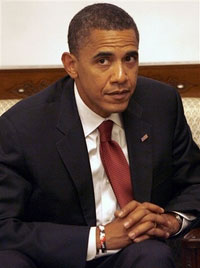Barack Obama obviously unable to solve conflict between Israel and Palestine
When Barack Obama comes to Israel this week, he's going to find plenty of skeptics wondering whether such a foreign policy neophyte has what it takes to finally nail down a solution to the Arab-Israeli conflict.

The Democratic presidential hopeful has already gotten himself into hot water over one of the thorniest issues in the Israeli-Palestinian divide: the status of disputed Jerusalem. Last month, he tried to woo Israel's powerful lobby in Congress by saying Jerusalem should be Israel's capital and "must remain undivided."
Palestinians, who claim the city's eastern sector as capital of a future state, were furious. Obama's attempts to defuse the flap then got him into trouble with some Israelis and their U.S. supporters, when he clarified his remarks to say Jerusalem's fate should be negotiated - the long-standing U.S. position.
"When the candidate lands here tomorrow, a fog of ambiguity will still hover over his position: It remains unclear whether Jerusalem, the focus of his brief trip, will be a united city under Israeli sovereignty or the capital of two states. Barack Obama doesn't have a clear idea himself, and he has been straddling the fence," former dovish lawmaker Yossi Sarid wrote in Monday's Haaretz newspaper.
Obama arrives in Israel late Tuesday after visiting Afghanistan, Iraq and Jordan. He is to meet with Israeli leaders and, unlike Republican rival John McCain, an avid Israel supporter who visited in March, he'll travel to the West Bank for talks with Palestinian leaders, too.
Obama has a solid Senate record of supporting Israel. He has reaffirmed his backing for Israel's right to defend itself and underscored the need to stop Iran from promoting terrorism or getting nuclear weapons. Like the Bush administration, he opposes negotiations with the Islamic militant Hamas, which rules the Gaza Strip.
Still, his openness to talking to Iran - Israel's bitterest enemy - and his relatively short stint on the U.S. national stage has made many Israelis uncomfortable at the prospect of an Obama presidency.
Ofer Malachi, a 40-year-old contractor from Jerusalem, says Obama would be "very dangerous for Israel" because of his willingness to engage in dialogue with Iran.
Israel is convinced Tehran is building nuclear weapons, despite its protestations to the contrary. Iran also backs two other Israeli foes, the Islamic Hamas that rules the Gaza Strip and Lebanon's Hezbollah guerrilla group.
Obama "doesn't have a clue about what is needed to survive in the Middle East," Malachi said.
The U.S. historically has been Israel's strongest ally, and has made the Jewish state the largest recipient of U.S. foreign aid. Politicians traditionally have courted the Jewish vote in the U.S. with demonstrations of loyalty to Israel.
But as far as Israel is concerned, Obama will have an especially hard act to follow. The Bush administration was a particularly staunch Israel backer.
During his first term, Bush handed Israel a letter supporting the Jewish state's retention of major settlement blocs under any final settlement with the Palestinians. And despite repeated Palestinian protests, U.S. officials did little more than slap Israel on the wrist when it flouted U.S. policy on issues like settlement building, or reneged on promises to remove settlement satellites known as outposts.
Laine Katz, who emigrated from Philadelphia to Israel in the 1970s, counts herself as one of Obama's earliest supporters. She maintains Israel would be better off with an American president who would take the Israeli government to task for thumbing its nose at U.S. policy.
"Maybe if we have an American president that actually set boundaries and expected Israel to stick to these boundaries, maybe we'd have some progress in the peace process, instead of behaving like a spoiled child that always gets its way," said Katz, 50.
Obama is a Christian who makes much of his faith. But some Israelis worry about his allegiances, seizing on the fact that his father and stepfather were Muslims, that he spent part of his childhood in Indonesia, the world's largest Muslim country, and that he has an Arabic middle name, Hussein.
Lawmaker Arieh Eldad of the ultranationalist National Union Party said the name "concerned" him.
"I guess that the Arab citizens of the Arab states around Israel would be concerned if a nominee for being president of the United States, his family name would be Cohen," he said.
Eldad said he feared Obama would identify more easily with Arabs than with Israelis, and added, "If you combine it with policies to leave Iraq and to negotiate with Iran, that adds to our concerns here."
Obama's comment embracing Jerusalem as Israel's undivided capital alienated Palestinians looking for an American leader who will pressure Israel into key concessions. His clarifications haven't undone the damage.
Saqer Al Tamimi, a 42-year-old merchant from the West Bank town of Ramallah, is a disillusioned former fan.
"We used to expect he would be better because he's black, and black people were subject to discrimination, and so they may do us, the Palestinians, justice," Al Tamimi said. "Unfortunately, when they reach a certain level, the policy is already formulated for them."
But the candidate has also generated interest in the Palestinian territories because of his magnetism and the attention he shows to the disenfranchised and underprivileged.
"I am attracted to Obama's charisma," said Marwan Alian, 22, a law student in Gaza City.
At the same time, Alian said, "I doubt he can make any significant changes in our lives. He has a very tough mission regarding Iraq and regarding the American economy, so I don't think he will have time to help us, even if he wants to."
Subscribe to Pravda.Ru Telegram channel, Facebook, RSS!




